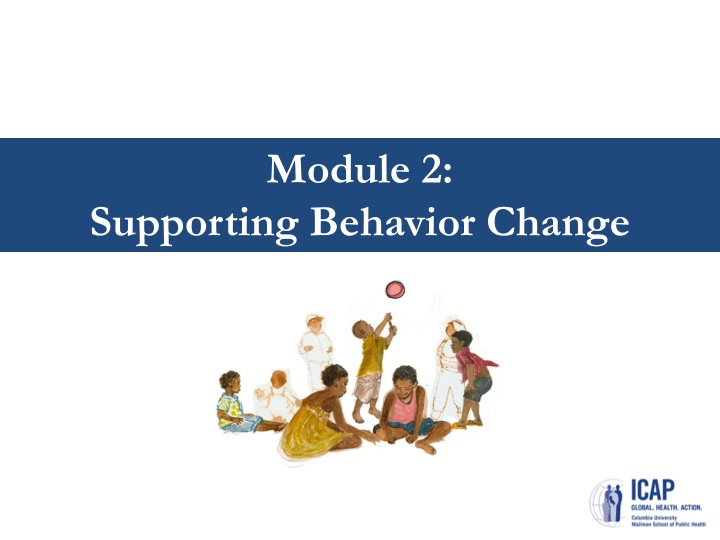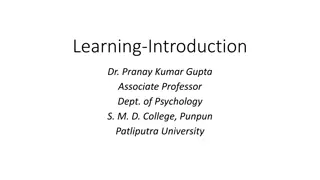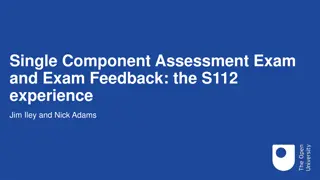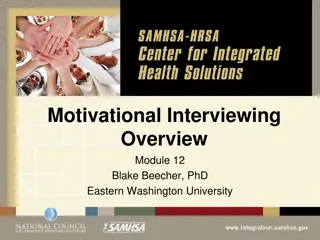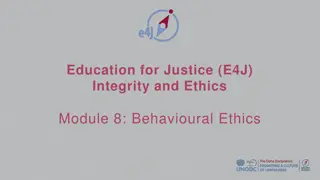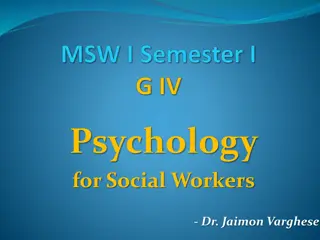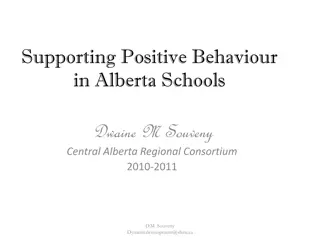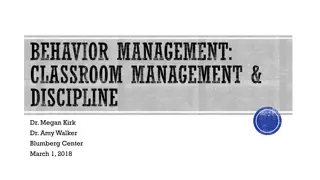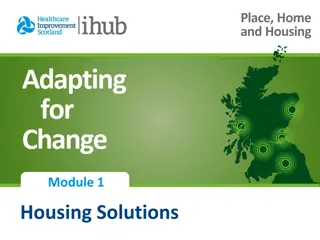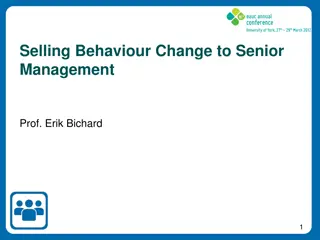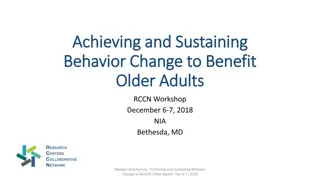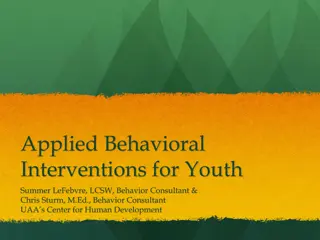Module 2: Supporting Behavior Change
This module focuses on key counseling techniques, such as building a therapeutic alliance, providing collaborative health education, and utilizing motivational interviewing. Learn how to establish trust, set individual goals, and instill hope in clients to support behavior change effectively.
Download Presentation

Please find below an Image/Link to download the presentation.
The content on the website is provided AS IS for your information and personal use only. It may not be sold, licensed, or shared on other websites without obtaining consent from the author.If you encounter any issues during the download, it is possible that the publisher has removed the file from their server.
You are allowed to download the files provided on this website for personal or commercial use, subject to the condition that they are used lawfully. All files are the property of their respective owners.
The content on the website is provided AS IS for your information and personal use only. It may not be sold, licensed, or shared on other websites without obtaining consent from the author.
E N D
Presentation Transcript
Module 2: Supporting Behavior Change
Learning Objectives Understand key counseling techniques Learn and apply motivational interviewing tools to adherence counseling
Outline Key Counseling Techniques Therapeutic Alliance Collaborative Health Education Motivational Interviewing
Therapeutic Alliance Eye Contact Active Listening Normalize and Be Nonjudgmental Demonstrating Caring Developing Trust Individual Goals Instill Hope Know Your Limits
Therapeutic Alliance Eye Contact Looking directly at someone is the first way to show them they are important and matter. Do not look at the flipchart or document while the person is talking. Eye Contact Active Listening When counseling, attend to the what the person says and demonstrate attention with body language. Nod when you understand someone. Ask follow-up questions to clarify: I want to understand better, can you tell me more?
Therapeutic Alliance Normalize and Be Nonjudgmental Many people struggle taking ARVs every day. Thank you for telling me so we can work together to make it easier. Demonstrating Caring With body language Leaning forward when someone is upset, offering a tissue if tearful Facial expressions: nonjudgment and kind With words I hear how hard that was, I m sorry you had to go through that. You are working so hard, I can tell you are handling so much.
Therapeutic Alliance Developing Trust Demonstrate you want the best for them My goal today is to help you be in control of your health. I would like to think together how we can make things better for you. If they tell you something difficult, be kind. Patient: I haven t been taking my medications. Provider: Thank you for sharing that with me, it is hard to talk about but I appreciate you trusting me with this. Let s talk about how we can work together for your health. Patient: I m just not sure I have HIV, I feel fine when I don t take my medication. Provider: I am so glad you brought this up. Let s discuss your concerns.
Therapeutic Alliance Individual Goals What do you hope will be better for you in the future? You ve said your children are the most important thing to you, how might being healthy help your children? What do you think would be better for you if you were taking medications? Instill Hope I see that you have strength to handle so many challenges, I m sure we can work together to help you take your medicine. You are so motivated to be healthy for your children, taking your medications will help keep you strong and well.
Therapeutic Alliance Know Your Limits If you feel someone needs more help than you can offer, find additional support and guidance. Only offer realistic potential supports otherwise you could lose trust
Normalize and Be Nonjudgmental Adherence is a common problem because it is hard. It is not the person in front of you being weak, it is the task that is hard.
Normalize and Be Nonjudgmental Nearly everyone misses doses. We need to help people feel comfortable talking about this extremely normal event. Nonadherence risks patients health. Providers are not harmed by nonadherence so we should not respond with anger or irritation.
Normalize and Be Nonjudgmental Many people struggle taking ARVs every day. Ask questions that make it clear you expect doses have been missed because this is normal: Tell me about your last missed dose? When was your last missed dose? What gets in the way when you miss a dose?
Normalize and Be Nonjudgmental Praise effort, not outcome. This will reduce over-reporting adherence so as not to disappoint you. That is wonderful that you are trying to take your medications every day. Your viral load is low, you must be working hard to take your ARVs.
Normalize and Be Nonjudgmental Viral Load is high What are some ways to give feedback?
Providing Health Education Collaboratively You have a lot of information and you want to help people understand their health. Providing information as a discussion rather than a lecture will: Maintain the therapeutic relationship Ensure the patient is receptive to the information Assess what the patient knows Target information that the patient needs Improve motivation for the patient to learn the information Help people become in charge of their own health Questions promote discussion and will encourage the patient to also ask questions when they don t understand.
Providing Health Education Collaboratively Ask Confirm Ask Inform Ask
Providing Health Education Collaboratively A lot of people struggle taking ARVs. What do you find most difficult? Ask I bet that is really frustrating. People keep telling you to do something you don t like, is hard to remember, and doesn t feel important. Confirm Would you like more information about why taking ARVs keeps you healthy? Ask Focus on immediate benefits like keeping partners healthy, fewer medical visits, keeping the body and brain healthy, and fewer medications. Inform What questions do you have about that information? Did any of those benefits seem important to you? With this information, how does it change how you think about ARVs? Ask
ACTIVITY Facilitators will demonstrate how to provide collaborative health education to discuss viral load. Ask Confirm Ask Inform Ask
Motivational Interviewing: Meeting People Where They Are We want to work with patients, not against them. Life events, skills, and knowledge affect readiness to change. If the provider is working to set goals with someone who has not committed to changing, this can lead to a struggle between you and your patient. Signs you may be working against your patient: You find yourself working hard to convince a patient Arguing with a patient When experiencing these signs, it is important to stop struggling with the patient and instead meet at his/her readiness to change.
Motivational Interviewing: Increasing Motivation to Change The following techniques can increase motivation to change and develop collaborative situations:
Motivational Interviewing: Increasing Motivation to Change Open Ended Questions: Avoid questions that are answered as Yes/No What makes it difficult for you to take ARVs every day? What have you already done to try to take your ARVs every day? What do you think is likely to happen if you keep taking your ARVs as you do now?
Motivational Interviewing: Increasing Motivation to Change Affirmations: Praise Effort to Change I appreciate that you are able to be honest about the way you take ARVs. You are clearly a resourceful person to manage so many challenges. You ve worked really hard to take your medications despite these challenges.
Motivational Interviewing: Increasing Motivation to Change Reflective Listening: Repeat back what they have told you You re wondering if it matters if you take ARVs. So you said you feel sad when you think about taking ARVs and that makes it really hard. What I heard you saying is you are so overwhelmed, your medications are the least of your problems right now.
Motivational Interviewing: Increasing Motivation to Change Summary Statements Let me see if I understand so far. You are struggling to take your ARVs because although you want to be well and healthy, you also have other problems in your life that make it difficult to focus on your health. Here s what I ve heard you say, let me know if it is right. You feel fine when you miss a dose and you are feeling really uncertain about whether ARVs are necessary to keep yourself healthy.
ACTIVITY Pair off with a partner and take turns role-playing patient and provider using the characters of Grace and John. Use OARS skills to discuss the character s problems with adherence.
Grace 28 years old Found out she was HIV+ 3 years ago while pregnant with her youngest daughter. Has three children (8, 6, and 3 years old) who are all HIV-. Took her medications every day while pregnant and breastfeeding, but now struggles to maintain adherence.
John 36 years old First diagnosed as HIV+ 10 years ago Works hard to maintain income for his family (wife and two children, ages 10 and 7) Has never taken his medications regularly for longer than a few months and has not noticed any problems with his health as a result
Discussion: Motivational Interviewing What was difficult about using these skills? What was different about your partner s response to an open-ended question? What did it feel like to have a statement affirmed? What made affirmations or reflections feel genuine (or not genuine)? How useful did summary statements feel?
Summary Accept: Approach behavior change nonjudgmentally. Collaborate: Before providing psychoeducation, questions are key to involving someone in learning. Motivate: Meeting someone where they are by demonstrating understanding can stimulate and support internal motivation. Remember to use OARS techniques!
